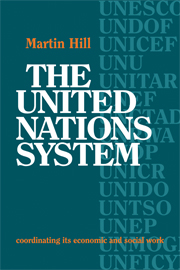Book contents
- Frontmatter
- Contents
- Foreword
- Preface
- Introduction
- Part I The problem of coordination and its setting
- 1 Relationship problems inherent in the decentralized United Nations System
- 2 Developments that have affected inter-agency relationships and coordination
- 3 The content of coordination activities
- 4 Intergovernmental organs responsible for coordination
- 5 The Administrative Committee on Coordination
- 6 The Secretary-General and the secretariats of the United Nations and the agencies
- 7 Some current constraints on order and coordination in the system
- Part II Some conclusions and suggestions
- Postscript
- 1 Abbreviations and glossary of institutions
- 2 Principal organs of the United Nations (General Assembly, Economic and Social Council and Secretariat) with main subsidiary organs directly concerned with economic and social cooperation and coordination (Status as of Spring 1976)
- 3 Chart of agencies related to the United Nations
- 4 Regional and branch offices of organizations of the United Nations System
- 5 Chart of the United Nations System
- 6 A new UN structure for global economic cooperation–list of conclusions and recommendations of the Group of Experts, prepared by the Secretariat
- Notes
- Index
5 - The Administrative Committee on Coordination
Published online by Cambridge University Press: 05 November 2011
- Frontmatter
- Contents
- Foreword
- Preface
- Introduction
- Part I The problem of coordination and its setting
- 1 Relationship problems inherent in the decentralized United Nations System
- 2 Developments that have affected inter-agency relationships and coordination
- 3 The content of coordination activities
- 4 Intergovernmental organs responsible for coordination
- 5 The Administrative Committee on Coordination
- 6 The Secretary-General and the secretariats of the United Nations and the agencies
- 7 Some current constraints on order and coordination in the system
- Part II Some conclusions and suggestions
- Postscript
- 1 Abbreviations and glossary of institutions
- 2 Principal organs of the United Nations (General Assembly, Economic and Social Council and Secretariat) with main subsidiary organs directly concerned with economic and social cooperation and coordination (Status as of Spring 1976)
- 3 Chart of agencies related to the United Nations
- 4 Regional and branch offices of organizations of the United Nations System
- 5 Chart of the United Nations System
- 6 A new UN structure for global economic cooperation–list of conclusions and recommendations of the Group of Experts, prepared by the Secretariat
- Notes
- Index
Summary
Organizations get together for coordination purposes or joint actions in many ways. There are hundreds of arrangements for informal and occasional consultations among ‘opposite numbers’ and quite a network of official committees linking two, three or even more members of the United Nations System (and in some cases outside agencies) on particular subjects, such as nutrition (FAO, WHO, UNICEF), protein (FAO, WHO) or occupational health (ILO, WHO). The World Food Programme works under the joint sponsorship of the United Nations and FAO, the International Centre for Theoretical Physics under that of UNESCO and IAEA. As mentioned earlier, joint divisions are maintained by some agencies with most of the regional economic commissions; there has also been some outposting of staff, as well as the establishment of liaison offices, between one organization and another.
While all such standing arrangements for specific purposes–and many more could be cited–are of interest in the context of the present study, central importance must be attached to the Administrative Committee on Coordination (ACC), composed of the executive heads of all organizations and programmes under the Secretary-General's chairmanship, which supervises the entire range of intersecretariat coordination and cooperation and plays a big part in the smooth and efficient functioning of the UN System. It is through ACC and its subsidiary bodies that most cooperative arrangements involving more than three or four agencies, and all system-wide arrangements for such purposes, on the immense variety of subjects on which cooperation or assimilation among several organizations is needed are worked out and supervized.
- Type
- Chapter
- Information
- The United Nations SystemCoordinating its Economic and Social Work, pp. 73 - 82Publisher: Cambridge University PressPrint publication year: 1978



